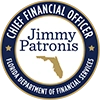**Consumer Alert** CFO Jimmy Patronis: Protect Yourself from Cyber Scams as Ransomware Targets the U.S. Healthcare System
10/29/2020
TALLAHASSEE, Fla. – Following recent reports of hackers using ransomware to attack the United States Healthcare System, Chief Financial Officer (CFO) Jimmy Patronis is encouraging Florida consumers and businesses to be vigilant in protecting their financial information and accounts and know the warning signs of cyber fraud and scams. Ransomware is a type of online scam where a hacker scrambles your business or personal data and holds it hostage until you pay a monetary ransom. Knowing how to recognize the warning signs of identity theft, fraud and scams can prevent citizens from falling victim to cybercriminal activity before it happens.
CFO Jimmy Patronis said, “This announcement is a stark reminder that criminals will stop at nothing to gain access and try to profit from our most sensitive information. Understanding what to look for when it comes to fraud and identify theft is how Floridians can protect themselves and their loved ones from becoming a victim. As Florida’s CFO, I will continue to work to defend our state from cyber threats and hold those who commit these crimes accountable. Learn how to protect yourself and your loved ones from fraud by visiting FraudFreeFlorida.com.”
Tips to Keep Your Personal Data Safe
• Protect your personal info on social media. Scam artists actively seek out personal information on social media accounts to make phishing emails appear more believable. Just because you receive an email containing details about you doesn’t mean it’s coming from a legitimate source.
• Be extra cautious about emails and attachments. Never open links or download attachments from suspicious emails, especially emails claiming to be connected to a data breach.
• Use two-factor authentication. You can protect your accounts even if your passwords become compromised by using a two-factor authentication. Two-factor authentication requires a password and another type of information to log in to your account, usually a code sent to you via text message.
• Safeguard your finances by checking credit card activity often. Examining account activity is vital to credit card safety. Many companies enable you to check recent transactions online or by phone. Additionally, make sure to sign up for email or text alerts regarding unusual activity.
CFO Jimmy Patronis said, “This announcement is a stark reminder that criminals will stop at nothing to gain access and try to profit from our most sensitive information. Understanding what to look for when it comes to fraud and identify theft is how Floridians can protect themselves and their loved ones from becoming a victim. As Florida’s CFO, I will continue to work to defend our state from cyber threats and hold those who commit these crimes accountable. Learn how to protect yourself and your loved ones from fraud by visiting FraudFreeFlorida.com.”
Tips to Keep Your Personal Data Safe
• Protect your personal info on social media. Scam artists actively seek out personal information on social media accounts to make phishing emails appear more believable. Just because you receive an email containing details about you doesn’t mean it’s coming from a legitimate source.
• Be extra cautious about emails and attachments. Never open links or download attachments from suspicious emails, especially emails claiming to be connected to a data breach.
• Use two-factor authentication. You can protect your accounts even if your passwords become compromised by using a two-factor authentication. Two-factor authentication requires a password and another type of information to log in to your account, usually a code sent to you via text message.
• Safeguard your finances by checking credit card activity often. Examining account activity is vital to credit card safety. Many companies enable you to check recent transactions online or by phone. Additionally, make sure to sign up for email or text alerts regarding unusual activity.
